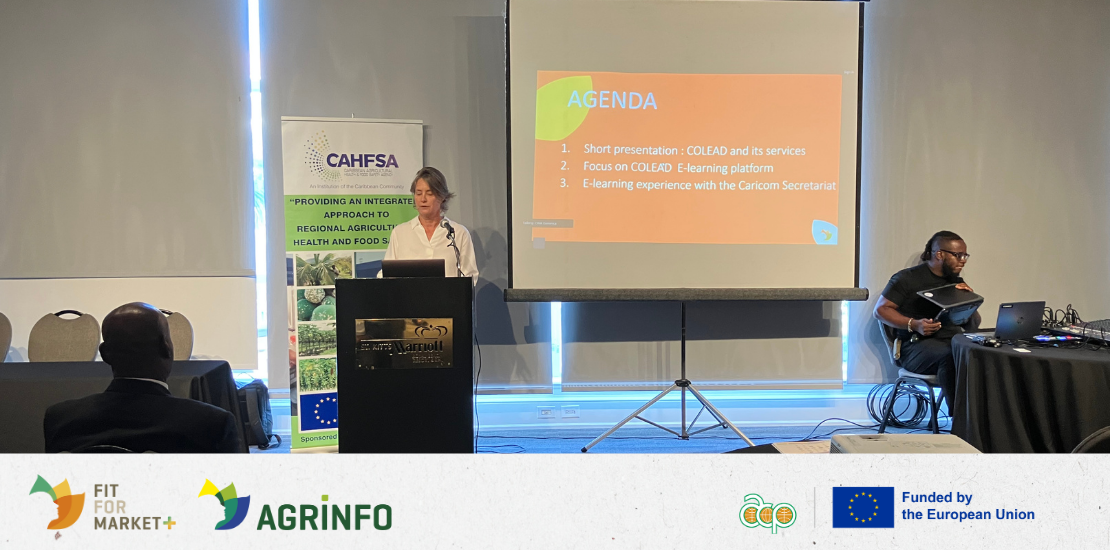- 03/11/2025
- Posted by: Sandra Borma
- Category: News

From 23 September to 8 October 2025, a dedicated mission took COLEAD to Saint Kitts and Nevis, Barbados, and Guyana under the Fit for Market Plus (FFM+) and AGRINFO programmes. The objective: to support the empowerment of Caribbean agricultural stakeholders while strengthening coordination with regional institutions and development partners.
This field mission also marked COLEAD’s first physical presence at the Caribbean Week of Agriculture (CWA), following several virtual participations since 2021.
Caribbean week of agriculture 2025: a strategic participation
Organised in Saint Kitts and Nevis by CARICOM, IICA, FAO, CARDI and other partners, CWA 2025 brought together governments, businesses, financial institutions, researchers and NGOs around a common vision: “25% by 2025 + 5” — reducing regional food import bills by 25%.
For COLEAD, the event provided a strategic platform for visibility and cooperation. The team contributed to several technical sessions, notably on the digitalisation of agriculture and innovation in post-harvest protection of root and tuber crops, in collaboration with IICA and CARDI respectively.
Beyond high-level discussions, the on-site presence helped to strengthen existing partnerships and establish new ones — including with the Anton de Kom University of Suriname, the World Food Programme, the Bahamas Centre for Food and Nutrition Security, Global Affairs Canada, and the FIAP (EU-Caribbean Fund for Nutrition).
Strengthening regional collaboration and strategic alliances
Bilateral meetings confirmed the strong momentum of partnership between COLEAD and regional actors, notably with:
- IICA, on renewing the technical partnership, developing training for extension and advisory services (Training of Trainers), and the Caribbean Agrifood Business Series;
- CARICOM Secretariat, for self-learning sessions on crop protection;
- CARDI and CAHFSA, on applied research, SPS standards, and technical training for support services;
- SMEs and agrifood processors in Barbados, Saint Kitts, and Guyana, as well as the Georgetown Chamber of Commerce and Industry, to refine needs assessments, structure development plans, and promote market access.
The Caribbean: a laboratory for resilience
Partners share a clear diagnosis: the region remains highly vulnerable to climate change, facing high logistics costs, limited agricultural labour, and low food self-sufficiency — particularly in fruits and vegetables. Yet these challenges are driving innovation: development of organic farms, controlled-environment and vertical farming, local processing of fruits, vegetables and tubers into juices, flours, sauces, or condiments; green entrepreneurship programmes; and urban agriculture initiatives in Guyana.
The European Union, through its delegations in Barbados and Guyana, reaffirmed its commitment to supporting this agricultural transition within the framework of the Global Gateway strategy.
A momentum sustained by the 5th Caribbean virtual agrifood trade mission
Building on field exchanges, COLEAD is joining IICA, SIECA and CARICOM to co-organise the 5th Caribbean Virtual Agrifood Trade Mission, from 28 to 30 October 2025.
This online event, accessible via the REDCA platform, will offer Caribbean agrifood enterprises an opportunity to meet buyers, promote their products, and expand their regional and extra-regional exports. The initiative aims to connect digital transformation with trade opportunities, leveraging e-commerce tools and international market standards.
2026: continuing the momentum
Next steps include consolidating the regional partner network and continuing the SIA project in the Dominican Republic as a lever for regional integration, with new targeted support actions and capacity-building activities (Training of Trainers in Guyana), as well as participation in the Caribbean Week of Agriculture 2026 in Jamaica.
COLEAD will thus continue to act as a facilitator between public policies, agripreneurs and investors, ensuring that Caribbean agricultural value chains continue to grow within a more inclusive, sustainable and connected framework.
This activity is supported by the Fit For Market Plus (FFM+) programme, implemented by COLEAD within the Framework of Development Cooperation between the Organisation of African, Caribbean and Pacific States (OACPS) and the European Union; and by the AGRINFO programme, implemented by COLEAD and funded by the European Union (EU). This publication receives financial support from the European Union and the OACPS. The content of this publication is the sole responsibility of COLEAD and can in no way be taken to reflect the views of the European Union or the OACPS.





